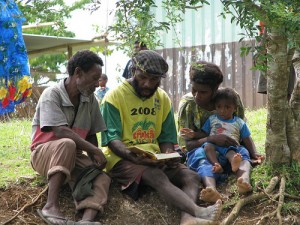I’ve usually posted daily updates during my research trips to Scotland. This year I went to Glasgow for my viva (the equivalent of the oral defense.) After the big event I spent most of my time visiting friends (and missing trains) so I didn’t keep a daily blog but thought I would post a summary of the whole trip now that I’m over my jet lag.
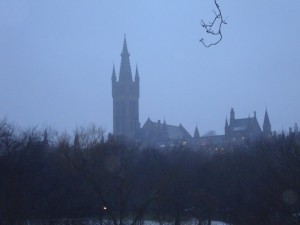 I arrived Thursday morning and wandered around the University to see what had changed since I was there last. I forgot how much I love Glasgow. I met with my supervisor that afternoon to prep for the viva the next day. I stayed at the cozy Alamo Guest house that evening.
I arrived Thursday morning and wandered around the University to see what had changed since I was there last. I forgot how much I love Glasgow. I met with my supervisor that afternoon to prep for the viva the next day. I stayed at the cozy Alamo Guest house that evening.
Friday I woke too late to get breakfast at the Guest House but fortunately found a place serving breakfast. My viva went well and after a late lunch with Professor Hazlett I was off by train to Gloucester, England to visit my friend Allan.
Saturday Allan showed me around Gloucester. We had lunch at Robert Raike‘s house, a pub in the former home of the founder of the Sunday School movement. (I discovered gammon – good stuff.) After dinner at an Indian restaurant (my first proper sit-down Indian meal) we went to the Fountain Inn to catch up. Sunday we worshiped at the United Reformed Church before I caught my train on the way back to Glasgow feeling absolutely stuffed.
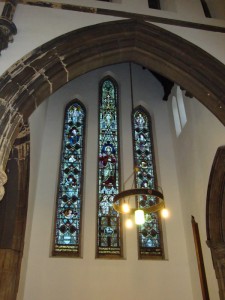
Window in St. Lawrence's
Things had been running so smooth. Before I left I had tried to book a room in Glasgow close to the rail station but I couldn’t get any of my cards to work with the online reservation system and the hotels I tried wouldn’t accept bookings by phone. (I’m suppressing a rant to get on with my story.) The train to Birmingham was very late. I’m not sure what caused the disruption – they announced that a train failed – but it caused a domino effect. I apparently had missed the last train to Glasgow and was put on another to Edinburgh which wouldn’t have been a problem had it not also been extremely late. Due to a general ignorance of English geography I really didn’t know where I was or which way I was going. I realized that it was going to be 2 AM before I got to Edinburgh which seemed awfully late to be trying to find a room. Then they announced the upcoming stops – Leeds…Wetherby…York. York – Tim! The only other folks I know in England live in York. Tim’s the Parish Priest at St Lawrence and St Hilda in York. I borrowed a kind stranger’s cell phone and called to let Tim know I would be in York soon – though I didn’t know when. I was welcomed into the Vicarage in the middle of the night. We reenacted one of Jesus’ parables (Luke 11:5-9) with a nearby Indian take-away that was just about to close.
Since I didn’t have anything scheduled for the next day, Tim invited me to accompany him on a car trip to Wales. He was going to visit family and I had to get a train from somewhere. I got to spend a little time with Tim’s family before heading off.
It was good to have an unexpected visit and catch up. Tim has recently been the subject of controversy for a pre-Christmas sermon criticizing the lack of assistance for the poor taken as advocating shoplifting. As we discussed the sermon and media reports (and distortions) I was shocked to hear that Church of England parishes don’t have some of the basic resources available to assist those in need that I’m used to here such as a pastor’s discretionary fund. I get the impression that the Church’s mission to the poor has been given to the priest personally, the state welfare system, or the Salvation Army.
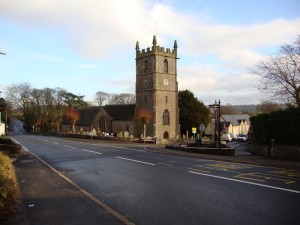
Church in Raglan
We had time to get a bite to eat in Raglan (had Welsh rabbit for the first time) before I caught the train to Glasgow from Abergavenny. Thankfully the train ride was uneventful and I was able to get to the hotel for some rest before a ridiculously early plane flight home.
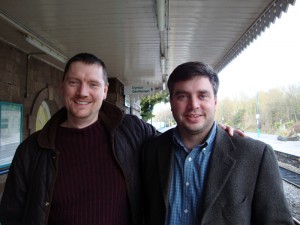
Dynion - Gentlemen
